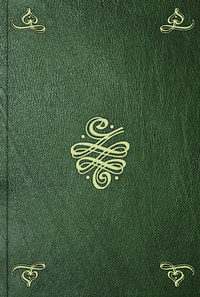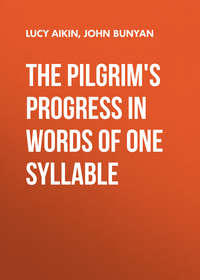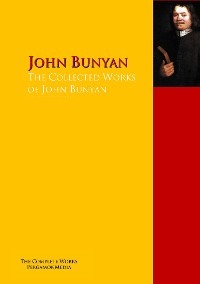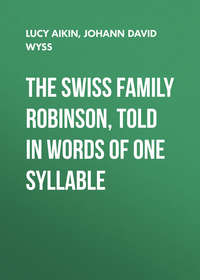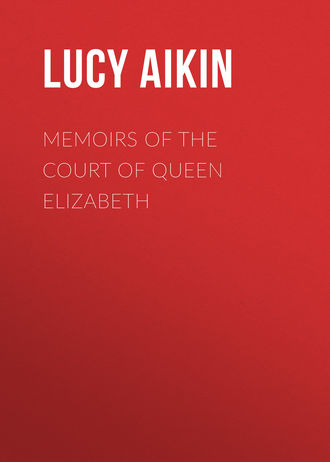 полная версия
полная версияMemoirs of the Court of Queen Elizabeth
Not long after, the earl was suddenly seized with a violent disorder of the bowels, which in a few days carried him off; and on the first day of his illness, his gentleman of the horse took his lord's best saddle-horse and fled. These circumstances might be thought pretty clearly to indicate poison as the means of his untimely end: but although a suspicion of its employment was entertained by some, the melancholy event appears to have been more generally ascribed to witchcraft. An examination being instituted, a waxen image was discovered in his chamber with a hair of the color of the earl's drawn through the body; also, an old woman in the neighbourhood, a reputed witch, being required to recite after a prompter the Lord's Prayer in Latin, was observed to blunder repeatedly in the same words. But these circumstances, however strong, not being deemed absolutely conclusive, the poor old woman was apparently suffered to escape:—after the gentleman of the horse, or his instigators, we do not find that any search was made.
The mother of this earl of Derby died two years after. At one period of her life we find her much in favor with the queen, whom she was accustomed to attend in quality of first lady of the blood-royal; but she had subsequently excited her majesty's suspicions by her imprudent consultations of fortune-tellers and diviners, on the delicate subject, doubtless, of succession to the crown.
The animosity between Elizabeth and her savage adversary the king of Spain was continually becoming more fierce and more inveterate. Undeterred by former failures, Philip was thought to meditate a fresh invasion either of England or of Ireland, which latter country was besides in so turbulent a state from the insurrections of native chieftains, that it had been found necessary to send over sir John Norris as general of Ulster, with a strong reinforcement of veterans from the Low Countries. The queen, on her part, was well prepared to resist and retaliate all attacks. The spirit of the nation was thoroughly roused; gallant troops and able officers formed in the Flemish school of glory, or under the banners of the Bourbon hero, burned with impatience for the signal to revenge the wrongs of their queen and country on their capital and most detested enemy. Still the conflict threatened to be an arduous one: Elizabeth felt all its difficulties; and loth to lose the support of one of her bravest and most popular captains, she addressed the following letter of recall to lord Willoughby, who had repaired to Spa ostensibly for the recovery of his health; really, perhaps, in resentment of some injury inflicted by a venal and treacherous court, of which his noble nature scorned alike the intrigues and the servility.
"Good Peregrine,
"We are not a little glad that by your journey you have received such good fruit of amendment, especially when we consider how great a vexation it is to a mind devoted to actions of honor, to be restrained by any indisposition of body from following those courses which, to your own reputation and our great satisfaction, you have formerly performed. And therefore we must now (out of our desire of your well-doing) chiefly enjoin you to an especial care to encrease and continue your health, which must give life to all your best endeavours; so we next as seriously recommend to you this consideration, that in these times, when there is such an appearance that we shall have the trial of our best and noble subjects, you seem not to affect the satisfaction of your own private contentation, beyond the attending on that which nature and duty challengeth from all persons of your quality and profession. For if unnecessarily, your health of body being recovered, you should elloign yourself by residence there from those employments whereof we shall have too good store, you shall not so much amend the state of your body, as haply you shall call in question the reputation of your mind and judgement, even in the opinion of those that love you, and are best acquainted with your disposition and discretion.
"Interpret this our plainness, we pray you, to an extraordinary estimation of you, for it is not common with us to deal so freely with many; and believe that you shall ever find us both ready and willing, on all occasions, to yield you the fruits of that interest which your endeavours have purchased for you in our opinion and estimation. Not doubting but when you have with moderation made trial of the successes of these your sundry peregrinations, you will find as great comfort to spend your days at home as heretofore you have done; of which we do wish you full measure, howsoever you shall have cause of abode or return. Given under our signet at our manor of Nonesuch, the 7th of October 1594, in the 37th year of our reign.
"Your most loving sovereign"E. R."We do not perceive the effects of this letter in the employment of lord Willoughby in any of the expeditions against Spain which ensued; but he was afterwards appointed governor of Berwick, and held that situation till his death in 1601.
Sir Walter Raleigh, that splendid genius with a sordid soul, whom a romantic spirit of adventure and a devouring thirst of gain equally stimulated to activity, had unexpectedly found his advancement at court impeded, after the first steps, usually accounted the most difficult, had been speedily and fortunately surmounted. Several conspiring causes might however be assigned for this check in his career of fortune. His high pretensions to the favor of the queen, joined to his open adherence to the party of sir Robert Cecil, had provoked the hostility of Essex; who, in defiance of him, at one of the ostentatious tournaments of the day, is said to have "filled the tilt-yard with two thousand orange-tawny feathers," the distinction doubtless of his followers and retainers. He had incurred the resentment of more than one of the order of bishops, by his ceaseless and shameless solicitations of grants and leases out of the property of the Church. In Ireland, he had rendered sir William Russell the lord deputy his enemy by various demonstrations of opposition and rivalry; at court, his abilities and his first rapid successes with her majesty had stirred up against him the envy of a whole host of competitors. Elizabeth, who for the best reasons had an extreme dislike to any manifestations of a mercenary disposition in her servants, had been disgusted by the frequency and earnestness of his petitions for pecuniary favors. "When, sir Walter," she had once exclaimed, "will you cease to be a beggar?" He replied, "When your gracious majesty ceases to be a benefactor." So dexterous an answer appeased her for a time; and the profusion of eloquent adulation with which he never failed to soothe her ear, engaged her self-love strongly in his behalf. But to complete the ill-fortune of Raleigh, father Parsons, provoked by the earnestness with which he had urged in parliament the granting of supplies for a war offensive and defensive against Spain, had published a pamphlet charging him with atheism and impiety, which had not only found welcome reception with his enemies, but with the people, to whom he was ever obnoxious, and had even raised a prejudice against him in the mind of his sovereign. On this subject, a writer contemporary with the later years of Raleigh thus expresses himself:
"Sir Walter Raleigh was the first, as I have heard, that ventured to tack about and sail aloof from the beaten track of the schools; who, upon the discovery of so apparent an error as a torrid zone, intended to proceed in an inquisition after more solid truths; till the mediation of some whose livelihood lay in hammering shrines for this superannuated study, possessed queen Elizabeth that such doctrine was against God no less than her father's honor; whose faith, if he owed any, was grounded upon school divinity. Whereupon she chid him, who was, by his own confession, ever after branded with the name of an atheist, though a known assertor of God and providence115."
The business of Mrs. Throgmorton, and the disputes arising out of the sale of the captured carrack, succeeded, to inflame still more the ill-humour of the queen; and Raleigh, finding every thing adverse to him at court, resolved to quit the scene for a time, in the hope of returning with better omens, when absence and dangers should again have endeared him to his offended mistress, and when the splendor of his foreign successes might enable him to impose silence on the clamors of malignity at home.
The interior of the pathless wilds of Guiana had been reported to abound in those exhaustless mines of the precious metals which filled the imaginations of the earliest explorers of the New World, and, to their ignorant cupidity, appeared the only important object of research and acquisition in regions where the eye of political wisdom would have discerned so many superior inducements to colonization or to conquest. The fabulous city of El Dorado,—which became for some time proverbial in our language to express the utmost profusion and magnificence of wealth,—was placed by the romantic narrations of voyagers somewhere in the centre of this vast country, and nothing could be more flattering to the mania of the age than the project of exploring its hidden treasures.
Raleigh conceived this idea; the court and the city vied in eagerness to share the profits of the enterprise; a squadron was speedily fitted out, though at great expense; and in February 1595 the ardent leader weighed anchor from the English shore. Proceeding first to Trinidad, he possessed himself of the town of St. Joseph; then, with the numerous pinnaces of his fleet, he entered the mouth of the great river Oronoco, and sailing upwards penetrated far into the bosom of the country. But the intense heat of the climate, and the difficulties of this unknown navigation, compelled him to return without any more valuable result of his enterprise than that of taking formal possession of the land in her majesty's name. Raleigh however, unwilling to acknowledge a failure, published on his return an account of Guiana, filled with the most disgraceful and extravagant falsehoods;—falsehoods to which he himself became eventually the victim, when, on the sole credit of his assurances, king James released him from a tedious imprisonment to head a second band of adventurers to this disastrous shore.
A still more unfortunate result awaited an expedition of greater consequence, which sailed during the same year, under Hawkins and Drake, against the settlements of Spanish America. Repeated attacks had at length taught the Spaniards to stand on their defence; and the English were first repulsed from Porto Rico, and afterwards obliged to relinquish the attempt of marching across the isthmus of Darien to Panama. But the great and irreparable misfortune of the enterprise was the loss, first of the gallant sir John Hawkins, the kinsman and early patron of Drake, and afterwards of that great navigator himself, who fell a victim to the torrid climate, and to fatigue and mortification which conspired to render it fatal. A person of such eminence, and whose great actions reflect back so bright a lustre on the reign which had furnished to him the most glorious occasions of distinguishing himself in the service of his country, must not be dismissed from the scene in silence.
The character of Francis Drake was remarkable not alone for those constitutional qualities of valor, industry, capacity and enterprise, which the history of his exploits would necessarily lead us to infer, but for virtues founded on principle and reflection which render it in a high degree the object of respect and moral approbation. It is true that his aggressions on the Spanish settlements were originally founded on a vague notion of reprisals, equally irreconcilable to public law and private equity. But with the exception of this error,—which may find considerable palliation in the deficient education of the man, the prevalent opinions of the day, and the peculiar animosity against Philip II. cherished in the bosom of every protestant Englishman,—the conduct of Drake appears to demand almost unqualified commendation. It was by sobriety, by diligence in the concerns of his employers, and by a tried integrity, that he early raised himself from the humble station of an ordinary seaman to the command of a vessel. When placed in authority over others, he showed himself humane and considerate; his treatment of his prisoners was exemplary, his veracity unimpeached, his private life religiously pure and spotless. In the division of the rich booty which often rewarded his valor and his toils, he was liberal towards his crews and scrupulously just to the owners of his vessels; and in the appropriation of his own share of wealth, he displayed that munificence towards the public, of which, since the days of Roman glory, history has recorded so few examples.
With the profits of one of his earliest voyages, in which he captured the town of Venta Cruz and made prize of a string of fifty mules laden with silver, he fitted out three stout frigates and sailed with them to Ireland, where he served as a volunteer under Walter earl of Essex, and performed many brilliant actions. After the capture of a rich Spanish carrack at the Terceras in 1587, he undertook at his own expense to bring to the town of Plymouth, which he represented in parliament, a supply of spring water, of which necessary article it suffered a great deficiency; this he accomplished by means of a canal or aqueduct above twenty miles in length.
Drake incurred some blame in the expedition to Portugal for failing to bring his ships up the river to Lisbon, according to his promise to sir John Norris, the general; but on explaining the case before the privy-council on his return, he was entirely acquitted by them; having made it appear that, under all the circumstances, to have carried the fleet up the Tagus would have been to expose it to damage without the possibility of any benefit to the service. By his enemies, this great man was stigmatized as vain and boastful; a slight infirmity in one who had achieved so much by his own unassisted genius, and which the great flow of natural eloquence which he possessed may at once have produced and rendered excusable. One trait appears to indicate that he was ambitious of a species of distinction which he might have regarded himself as entitled to despise. He had thought proper to assume, apparently without due authority, the armorial coat of sir Bernard Drake, also a seaman and a native of Devonshire: sir Bernard, from a false pride of family, highly resented this unwarrantable intrusion, as he regarded it, and in a dispute on the subject gave sir Francis a box on the ear. The queen now deemed it necessary to interfere, and she granted to the illustrious navigator the following arms of her own device. Sable, a fess wavy between two pole stars argent, and for crest, a ship on a globe under ruff, with a cable held by a hand coming out of the clouds; the motto Auxilio divino, and beneath, Sic parvis magna; in the rigging of the ship a wivern gules, the arms of sir Bernard Drake, hung up by the heels.
Sir John Baskerville, who succeeded by the death of Drake to the command of the unfortunate expedition to which he had fallen a sacrifice, encountered the Spanish fleet off Cuba in an action, which, though less decisive on the English side than might have been hoped, left at least no ground of triumph to the enemy. Meantime the court was by no means barren of incident; and we are fortunate in possessing a minute and authentic journal of its transactions in a series of letters addressed to sir Robert Sidney governor of Flushing by several of his friends, but chiefly by Rowland Whyte, a gentleman to whom, during his absence, he had recommended the care of his interests, and the task of transmitting to him whatever intelligence might appear either useful or entertaining116.
In October 1595 Mr. Whyte mentions the following abominable instance of tyranny. That the earl of Hertford had been sent for by a messenger and committed to custody in his own house, because it had appeared by a case found among the papers of a Dr. Aubrey, that he had formerly taken the opinions of civilians on the validity of his first marriage, and caused a record of it to be secretly put into the court of Arches. Whyte adds significantly, that the earl was accounted one of the wealthiest subjects in England. Soon after, his lordship was committed to the Tower; and it was said that orders were given that his son, who since the establishment of the marriage had borne the title of lord Beauchamp, should henceforth be again called Mr. Seymour. Several lawyers and other persons were also imprisoned for a short time about this matter, under what law, or pretext of law, it would be vain to inquire. Lady Hertford, though a sister of the lord admiral and nearly related to the queen, was for some time an unsuccessful suitor at court for the liberty of her lord. Her majesty however was graciously pleased to declare that "neither his life nor living should be called in question;"—as if both had been at her mercy! and though she would not consent to see the countess, she regularly sent her broths in a morning, and, at meals, meat from her own trencher;—affecting, it should seem, in these trifles, to acquit herself of the promises of her special favor, with which she had a few years before repaid the splendid hospitality of this noble pair. We do not learn how long the durance of the earl continued; but it is highly probable that he was once more compelled to purchase his liberty.
Great uneasiness was given about this time to the earl of Essex by a book written in defence of the king of Spain's title to the English crown, which contained "dangerous praises of his valor and worthiness," inserted for the express purpose of exciting the jealousy of the queen and bringing him into disgrace. The work was shown him by Elizabeth herself. On coming from her presence he was observed to look "pale and wan," and going home he reported himself sick;—an expedient for working on the feelings of his sovereign, to which, notwithstanding the truth and honor popularly regarded as his characteristics, Essex is known to have frequently condescended. On this, as on most occasions, he found it successful: her majesty soon made him a consolatory visit; and in spite of the strenuous efforts of his enemies, this attempt to injure him only served to augment her affection and root him more firmly in her confidence.
"Her majesty," says Whyte soon after, "is in very good health, and comes much abroad; upon Thursday she dined at Kew, at my lord keeper's house, (who lately obtained of her majesty his suit for one hundred pounds a year in fee-farm,) her entertainment for that meal was great and exceeding costly. At her first lighting she had a fine fan garnished with diamonds, valued at four hundred pounds at least. After dinner, in her privy-chamber, he gave her a fair pair of virginals. In her bed-chamber, he presented her with a fine gown and a juppin, which things were pleasing to her highness; and, to grace his lordship the more, she of herself took from him a fork, a spoon, and a salt, of fair agate." It must be confessed that this was a mode of "gracing" a courtier peculiarly consonant to the disposition of her majesty.
The further Elizabeth descended into the vale of years, the stronger were her efforts to make ostentation of a youthful gaiety of spirits and an unfailing alacrity in the pursuit of pleasure; though avarice, the vice of age, mingled strangely with these her juvenile affectations. To remark to her the progress of time, was to wound her in the tenderest part, and not even from her ghostly counsellors would she endure a topic so offensive as the mention of her age: an anecdote to this effect belongs to the year 1596, and is found in the account of Rudd bishop of St. Davids given in Harrington's Brief View of the Church.
"There is almost none that waited in queen Elizabeth's court and observed any thing, but can tell that it pleased her very much to seem, to be thought, and to be told that she looked young. The majesty and gravity of a sceptre borne forty-four years could not alter that nature of a woman in her: This notwithstanding, this good bishop being appointed to preach before her in the Lent of the year 1596… wishing in a godly zeal, as well became him, that she should think sometime of mortality," took a text fit for the purpose, on which he treated for a time "well," "learnedly," and "respectively." "But when he had spoken awhile of some sacred and mystical numbers, as three for the Trinity, three for the heavenly Hierarchy, seven for the Sabbath, and seven times seven for a Jubilee; and lastly,—seven times nine for the grand climacterical year; she, perceiving whereto it tended, began to be troubled with it. The bishop discovering that all was not well, for the pulpit stands there vis à vis to the closet, he fell to treat of some more plausible numbers, as of the number 666, making Latinus, with which he said he could prove the pope to be Antichrist; also of the fatal number of 88,—so long before spoken of for a dangerous year,… but withal interlarding it with some passages of Scripture that touch the infirmities of age… he concluded his sermon. The queen, as the manner was, opened the window; but she was so far from giving him thanks or good countenance, that she said plainly he should have kept his arithmetic for himself. 'But I see,' said she, 'the greatest clerks are not the wisest men;' and so went away for the time discontented.
"The lord keeper Puckering, though reverencing the man much in his particular, yet for the present, to assuage the queen's displeasure, commanded him to keep his house for a time, which he did. But of a truth her majesty showed no ill nature in this, for within three days she was not only displeased at his restraint, but in my hearing rebuked a lady yet living for speaking scornfully of him and his sermon. Only to show how the good bishop was deceived in supposing she was so decayed in her limbs and senses as himself perhaps and other of that age were wont to be; she said she thanked God that neither her stomach nor strength, nor her voice for singing, nor fingering instruments, nor, lastly, her sight, was any whit decayed; and to prove the last before us all, she produced a little jewel that had an inscription of very small letters, and offered it first to my lord of Worcester, and then to sir James Crofts to read, and both protested bona fide that they could not; yet the queen herself did find out the poesy, and made herself merry with the standers by upon it."
A point of some importance to the peers of England was about this time brought to a final decision by the following circumstance. Sir Thomas, son and heir of sir Matthew Arundel of Wardour-castle, a young man of a courageous and enterprising disposition, going over to Germany, had been induced to engage as a volunteer in the wars of the emperor against the Turks; and in the assault of the city of Gran in Hungary had taken with his own hand a Turkish banner. For this and other good service, Rodolph the Second had been pleased to confer upon him the honor of count of the holy Roman empire, extending also, as usual, the title of counts and countesses to all his descendants for ever. On his return to England in the year following, the question arose whether this dignity, conferred by a foreign prince without the previous consent of his own sovereign, should entitle the bearer to rank, precedence, or any other privilege in this country.
The peers naturally opposed a concession which tended to lessen the value of their privileges by rendering them accessible through foreign channels; and her majesty, being called upon to settle the debate, pronounced the following judgement. That the closest tie of affection subsisted between sovereigns and their subjects: that as chaste wives should fix their eyes upon their husbands alone, in like manner faithful subjects should only direct theirs towards the prince whom it had pleased God to set over them. And that she would not allow her sheep to be branded with the mark of a stranger, or be taught to follow the whistle of a foreign shepherd. And to this effect she wrote to the emperor, who by a special letter had recommended sir Thomas Arundel to her favor. The decision appears to have been reasonable and politic, and would at the time be regarded as peculiarly so in the instance of honors conferred on a catholic gentleman by a catholic prince. King James, however, created sir Thomas, lord Arundel of Wardour; and he seems to have borne in common speech, the title of count117.


